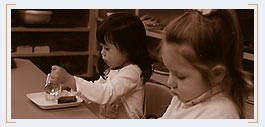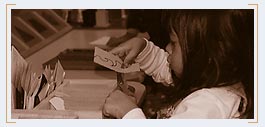The Montessori Philosophy:
Intelligence, Creativity, and Character
The Montessori method of education has been used successfully the world over for nearly 100 years. Developed by Dr. Maria Montessori, Italy’s first woman physician, the Montessori method was revolutionary in that it offered a scientific, observational, and developmentally based viewpoint of the child. Dr. Montessori’s additional doctorates in philosophy and anthropology, as well as her experiences among Italy’s poorest children, lent her methods the weight of authenticity.
The Montessori method allows each individual child to strive toward his or her highest potential by providing an environment of beauty, order and reality.
The Montessori environment is designed to satisfy this innate motivation toward self-development. It is through self-development or "work", that the child is led to the mastery of social skills, academic concepts and critical, creative thinking.
A low student-to-teacher ratio makes it possible to offer personal attention and accommodation in a non-competitive environment.
Conceptual Learning Through Concrete Experience
In our classrooms, learning takes place as a result of the child’s active participation, experimentation and practice with specialized manipulative materials. These real-life experiences are "play" to the child but are purposeful and organized in nature. Each activity is sequenced, so as a child masters a concept, the next concept can be introduced in a logical process. Rather than being rigid, this teaching method actually frees the child to be creative by eliminating confusion and fostering experiences of success. Activities progress from more concrete to more abstract and place increasing but appropriate challenges on a child’s concentration and organizational skills.


